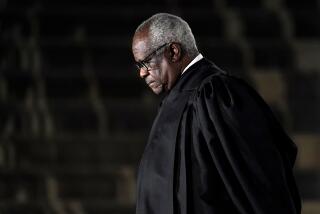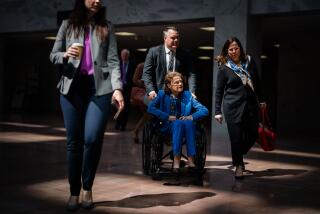Dole Reserving Judgment on Ginsburg
- Share via
WASHINGTON — Senate Minority Leader Bob Dole (R-Kan.), a key supporter of defeated Supreme Court nominee Robert H. Bork, said Tuesday that he will not decide whether to back new appointee Douglas H. Ginsburg until conflict-of-interest questions over Ginsburg’s former ownership of cable television stock are resolved.
At the same time, the Justice Department, increasingly concerned about the ethics questions, released new documents that rebut charges Ginsburg favored his own financial interests when, as a Justice Department official, he drafted the government’s position in a major Supreme Court cable television case.
One of the documents, a stock prospectus issued by a cable television company in which Ginsburg owned $140,000 in stock, indicates that the company was unenthusiastic about the position Ginsburg advocated.
Dole’s cautious statements on Ginsburg are in sharp contrast to his vehement early support for Bork. After leaving a White House meeting with President Reagan, Dole said Tuesday that he wanted to hear more about Ginsburg’s role in the cable television decisions before deciding whether to support him.
Asked about his support, Dole said dryly: “Get the hearings started. . . . I want to hear what they say.”
In answer to a reporter who asked why as Senate Republican leader he was not backing the President’s nominee “automatically,” Dole said: “I’m almost automatic, but I want to find out about the cable thing myself.”
Dole’s caution underlines a key political problem both for supporters of Ginsburg and for those wary of him: because the nominee’s record is sparse and his views on contentious issues unknown, activists have not been able to whip up strong political enthusiasm either for or against him.
That lack of enthusiasm has left a large majority of the Senate uncommitted on the nomination. And in the absence of strong debate about the nominee’s views, questions about his experience, his past and his ethical standards while at the Justice Department have assumed greater importance.
A conservative activist who supported Bork declared: “Our grass roots have to get a feel for it, and they don’t have a feel for it. . . . There’s not enough evidence to reach conclusions” on Ginsburg, “you need a leap of faith.”
1986 Stock Prospectus
The Justice Department’s rebuttal to the ethics charges against Ginsburg relies heavily on a 1986 stock prospectus that Rogers Cablesystems of America, the company in which Ginsburg held stock, issued about the same time Ginsburg was drafting the government’s position in a Supreme Court challenge to Los Angeles’ cable franchise policies. A federal appeals court had invalidated a Los Angeles policy allowing only one franchise to serve each area of the city, saying it violated the Constitution’s guarantee of a free press.
The prospectus contains a discussion of the litigation, saying that if the lower court decision were upheld it likely would cause “increased competition” within the industry, “a result which may adversely affect the profitability of the company’s systems.”
Although the brief Ginsburg wrote did not ask the high court to uphold the lower court decision entirely, the company’s position at the time undercuts the argument that Ginsburg took a position that would cause his $140,000 in stock to increase in value.
Ginsburg has since sold his stock, some of it late last year and the rest early this year, according to his spokesman, W. Stephen Cannon. His financial disclosure statements indicate that he made a substantial profit. Late in 1985, he converted Rogers bonds into stock. The company’s financial documents show the stock price for that conversion at $10.15 per share. When Ginsburg sold the stock the sale price was about 50% higher.
The Justice Department also issued a statement indicating that Ginsburg had played no active role in two other proceedings involving the cable industry, regulatory proceedings in which he signed papers but only in a pro forma manner as head of the department’s antitrust division. Rogers was not among the 20 companies investigated in a third proceeding, an inquiry into potential antitrust violations in the cable industry, a senior department official said.
In other developments:
--White House spokesman Marlin Fitzwater lashed out Tuesday at the American Civil Liberties Union, accusing it of trying to delay Ginsburg’s hearings, a charge that the group denied.
Before Ginsburg was nominated, Morton H. Halperin, the head of the ACLU’s Washington office, wrote Senate Judiciary Committee Chairman Joseph R. Biden Jr. (D-Del.) suggesting that the committee should allow a 60-day study period before beginning hearings on any high court nominee. Fitzwater charged that the suggestion was an attempt to “gear up” a campaign against Ginsburg. The group denied the charge.
--Rep. John D. Dingell (D-Mich.) wrote to the Judiciary Committee suggesting that government officials may have destroyed documents that his panel was seeking in connection with an investigation of a case Ginsburg was involved with while at the Justice Department.
More to Read
Get the L.A. Times Politics newsletter
Deeply reported insights into legislation, politics and policy from Sacramento, Washington and beyond. In your inbox twice per week.
You may occasionally receive promotional content from the Los Angeles Times.











